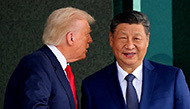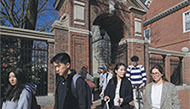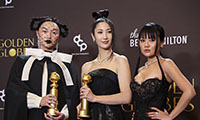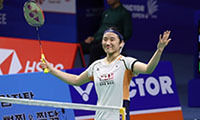It? Not the West vs. the Rest. It? Diversity and Community: Dr. Tu
Contributing Writer
East Asia has felt the impact of the modern West, one example of which is finding a niche for Confucian studies in modern East Asian studies, said Dr. Tu Weiming, director of Harvard-Yenching Institute.
Dr. Tu spoke at the International Conference on East Asian Studies on Nov. 23 which concluded Nov. 24 and coincided with the opening of the new Academy of East Asian Studies (AEAS) at Sungkyunkwan University in Seoul.
The Enlightenment mentality was introduced as a "dominant ideology" in East Asia, said Dr. Tu in his lecture called, "The Global Significance of Local Knowledge: A New Perspective on Confucian Humanism." Confucian studies, he said, was replaced by western learning in the East Asian education curriculum.
However, East Asian studies are far from disappearing from university curriculums. According to Dr. Tu, Confucian studies in North America began in the early part of the 20th century. There are three epochs of Confucian learning: the classical, the neo-Confucian and the modern. "I would say as of now in the area of history, literature, philosophy, social sciences, anyone who is interested in East Asia inevitably encounters the Confucian tradition; even though we don? have any major programs focusing on Confucianism exclusively," he said.
In East Asia, Dr. Tu said the interest in Confucian studies is a fascinating phenomenon. "Korea has always been a major center for Confucian studies in East Asia, we?e in the Sungkyunkwan, this university is noted for its Confucian studies," he said. "There? no question about Confucianism study both as an academic subject, but also as a habits of the heart, meaning the cultural resources widely accepted and sometimes not clearly acknowledged."
The most intriguing phenomenon regarding Confucian studies is in China, said Dr. Tu, who was born in China but grew up in Taiwan. Dr. Tu went back in 1978 and then stayed one year studying in Peking Normal University in 1980. He said at the time there were only sporadic expressions of interest in Confucianism in the faculty departments of history, literature, and philosophy. "I was invited to give a course on Confucian philosophy at Peking University in 1985, I must say that could be considered as a new beginning, as some of the most brilliant Chinese students became interested in their own heritage after the cultural revolution," Dr. Tu said, adding that a paper presented by professor Wang Zhong Jiang at the conference, "The Study of Confucianism in the 1990? as a New Paradigm," points to a major upsurge of interest in Confucian studies in the 1990s there have been more than 600 books published and thousands of articles.
Dr. Tu explained that earlier in the mid-19th century, there was a very serious concern among East Asian intellectuals about how to protect their Confucian heritage from the influence of the West. With the collapse of the military, the need to reform political institutions, and the undermining of social organizations like the family, some East Asian intellectuals accepted the fact that unless East Asia became thoroughly westernized they could not survive, he said. As a result, many East Asian societies abandoned their Confucian traditions. "But in the last 50 years," Dr. Tu said, "since the Second World War, I would say that all of these societies have become thoroughly westernized."
However, instead of abandoning their eastern values and ideas, many East Asian cultures have simply included some Western values into their already established cultural heritage. "And it is after more than 150 years of learning from the West, they could actually talk about western learning from within rather than simply from without," said Dr. Tu. "Now they are participants rather than observers, and now they begin to retrieve their own cultural resources. And part of the reason is because newly emerging intellectual trends in the West [such as environmentalism] that prompted us to become more critical of the Enlightenment tradition form the West."
Korea is just one example of the many East Asian countries that has embraced Western ideas. "The younger generation in Korea is very cosmopolitan compared to the Japanese and Chinese," Dr. Tu said in an hour-long interview with The Korea Times following his lecture. "The society here as a whole is such a crossroad of ideas." He pointed out that almost 30 percent of the Korean population is Christian, demonstrating that it is one of the most westernized societies in the world.
The young democracy in Korea is both fragile and unique, said Dr. Tu who added that the advantage of the latecomers (to democratic ideas) is that they have so many models that they are not "sucked into one particular model" and they can learn from others mistakes.
East Asian studies such as Confucian studies have been influenced by the West but Dr. Tu sees it as being a benefit rather than a detriment. "Without western influence, Confucianism could have been totally outmoded," he said. "With the western influence revitalization, this new sense of being part of the West, at the same time a retreat to cultural tradition, gives East Asian intellectuals a kind of creative edge for developing new ideas, that to me is the most exciting part of it." Dr. Tu stressed that this is not narrow nationalism, or "the West against the rest."
The future survival of Confucian studies as well as East Asian studies as a whole may be assisted by the current interest in all things Asian in the world said, Dr. Tu. The seemingly new interest in eastern culture and traditions is not new. He said there was an upsurge of European interest in East Asia after the First World War following fears about the decline of the West. "Yet after the Second World War," said Dr. Tu, "the European and American intellectuals were not interested in Asia at all; they were obsessed with the West. East Asian intellectuals also became attracted to the West." He said it has only been in the last 20 or 30 years that western intellectuals began to quest for the global ethic and realized they needed to broaden their resources to extend past those that has been generated ever since the Enlightenment of the 17th century and began looking towards East Asia when looking at issues related to ecology, feminism and religious pluralism.
Dr. Tu said it is time for Westerners to learn that even in a country like Korea, where people appear to be Westernized, Koreans are different. "The world is not going to be dominated by one culture tradition, we call it religious pluralism, which means there will be more than one center," he said.
The notion that western ideas must be adopted to be successful is simply not the case said Dr. Tu. In his lecture, he said, that China rejected Confucian humanism as a "necessary precondition for embarking on a new approach to save the nation," from foreign aggression. Dr. Tu said when he started to lecture on some of these issues in China the people were very surprised about his position because they all assumed that if you want to be modern you have to get rid of the Confucian traditions. "Right now in Korea, some scholars say Confucius must die or the Confucian tradition must die so Korea can become modern," he said. In America there has always been the notion of the ?elting pot when it concerned issues of cultural diversity that meant immigrants were expected to give up their cultural heritage to be considered fully American. Dr. Tu was naturalized as an American citizen in 1976 and said he didn? feel pressured to abandon his eastern ideals living in the West. "(However) no matter how hard I try, there is always a gap I am not a native speaker," he said. "On the other hand I do have some resources that are not part of the American culture that I feel encouraged to offer or to share. It? a double-edged sword, on one hand I feel inadequate, on the other I feel I am more blessed than someone who is not brought up in dual cultural background."
When asked about the role of Confucian Humanism in the 21st century, Dr. Tu said two words came into mind: diversity and community. "We have to celebrate diversity but we have to search for common humanity in terms of the global community," he said. "So Confucianism, among many other spiritual traditions seems to have a lot of resources that can be mobilized for this purpose." Christianity, unlike Confucianism has been able to thrive as perhaps the most influential religion in the world. The Vatican has claimed 800 million followers. Dr. Tu doubts that Christianity will be the only religion in the world, pushing Judaism, Buddhism and Confucianism into the background.
He outlined some of the common misconceptions associated with Confucianism by saying, "All the accusations, none of them are a figment of the mind, every one of them is based on very good empirical data." One misconception involves the consideration of nation and community above the individual as a Confucian dictum. Dr. Tu said this is a misuse of Confucianism. "On the surface it? very true; the nation is so big and so is the community, but within the Confucian tradition there is a very strong feeling that the dignity of the individual, while confounded with the corruption of the society, and the total privatization of national interests by the elite, we have to be able to say no." He cited Korea? example where the economy has suffered through corruption scandals in a society that has been under the influence of Confucian culture.
"Christianity too can lead to corruption, tension, exclusivism, but then in the Biblical tradition, Christianity is such a spiritual force for human flourishing all over the world," Dr. Tu said. "Sometimes the tradition, for various reasons, sometimes irrational forces that the tradition has become very detrimental to human flourishment, like Confucianism as perceived by some of the best minds in the early part of the 20th century."
One of Confucianism? greatest contributions to society has been the idea of the public intellectual someone who is according to Dr. Tu "politically concerned, socially engaged and culturally sensitive and informed." These are not academics but include those in the mass media, government, business, and social organizations. "This is really a major heritage in East Asia, you don? find the same heritage in other civilizations," he said.
Dr. Tu said the digitalization of today? society has hindered the ability of transmitting values, such as those of Confucianism from one generation to another. Firstly, he said the young people have lost their art of listening because they are bombarded by all kinds of sounds. Secondly, face-to-face communication is competing with virtual reality. "You cannot really feel a handshake in virtual reality and emotionally invested feelings cannot be transmitted, not to mention love-making." Lastly, "the cumulative wisdom of the elders," Dr. Tu said is best transmitted by teaching by rather than merely by words.
In this era of globalization where people and nations are becoming more alike than different, Dr. Tu thinks the time is right for us to think beyond the either/or dichotomy and think in terms of both / and. "Certainly the global community that emerges will integrate not just east and west but north and south, especially traditions and modernity," he said.
스마터리빙
more [ 건강]
[ 건강]이제 혈관 건강도 챙기자!
[현대해운]우리 눈에 보이지 않기 때문에 혈관 건강을 챙기는 것은 결코 쉽지 않은데요. 여러분은 혈관 건강을 유지하기 위해 어떤 노력을 하시나요?
 [ 건강]
[ 건강]내 몸이 건강해지는 과일궁합
 [ 라이프]
[ 라이프]벌레야 물럿거라! 천연 해충제 만들기
 [ 건강]
[ 건강]혈압 낮추는데 좋은 식품
[현대해운]혈관 건강은 주로 노화가 진행되면서 지켜야 할 문제라고 인식되어 왔습니다. 최근 생활 패턴과 식생활의 변화로 혈관의 노화 진행이 빨라지고
사람·사람들
more
[한인단체 신년 인터뷰] KYCC 송정호 관장… “지역사회 위한 종합 서비스 강화”
LA 한인타운 대표 비영리단체 한인타운청소년회관(KYCC)의 송정호 관장은 “지금 우리가 하는 일은 커뮤니티 ‘니즈’가 있기 때문에 존재한다”…

[한인단체 신년 인터뷰] LA 평통 장병우 회장… “본연 역할로 한반도 평화 실질 기여”
민주평화통일자문회의 LA협의회(이하 LA 평통) 장병우 회장은 6일 본보와의 신년 인터뷰에서 붉은 말의 해인 병오년 새해를 맞아 신년 화두로 …
워싱턴주에 첫 한인 시의장
워싱턴주에서 첫 한인 시의회 의장이 탄생했다. 제이슨 문(한국명 문태원) 머킬티오 시의원이 새해 들어 시의장으로 선출되며 또 하나의 중책을 맡…
국회 방문단 대한인국민회 방문
윤후덕·이해식·김한규 의원과 조오섭 국회의장 비서실장 등 10여 명의 한국 국회방문단이 지난 5일 LA를 찾아 로즈데일 묘지와 국민회관 등 미…
[한인단체 신년 인터뷰] 명원식 파바월드 회장… …
“한인 차세대들이 바르게 자랄 수 있는 토대를 만드는 것이 제가 파바월드의 회장으로 존재하는 유일한 이유입니다”한인사회의 대표적 청소년 봉사 …
많이 본 기사
- 트럼프 “이민자 시민권도 박탈한다”
- LA 길거리 매춘 단속 대폭 강화… “고객도 처벌”
- ‘나혼산’, 다 거짓? “박나래 남자친구도 새벽 회동..반려견 복돌이 돌본 적 없다” 前 매니저 반격
- 인앤아웃서 100달러 위폐 12개 매장 사용 2명 체포
- H-1B 비자 등 최대 3천달러 육박… 이민 신청 급행 수수료 또 오른다
- 재외국민 4분의 1이 노인 ‘초고령 사회’
- “한인 프리스쿨서 4세 여아 성추행 피해” 주장
- “집값보다 무서운 유지비”… 올해도 재산세·보험료↑
- “귀화 시민권 박탈 기준 검토” 파장
- “최대 6천불 추가 공제돼요”
- 에어프레미아, 연중 최대 할인
- VA 페어팩스 세금 폭탄에 기업·주민‘탈출 러시’우려
- 새 VA 주지사는 의원을 좋아해
- 워싱턴 일원 홈스쿨링 학생‘급증’
- ‘ICE 총격’ 주말 미 전역 항의 시위
- ‘코요테 주의’… 남가주 주택가서 급증
- 연방하원 본회의서 나온 한국어 인사… “김영옥 누나, 감사합니다”
- ‘도심 한가운데 나타난 소떼’
- 워싱턴차세대협 의사당 투어 참가 학생 모집
- 보아, SM과 25년 만에 작별… “한류 개척한 ‘아시아의 별’”
- 뉴욕시 400만 달러 투입 공중화장실 설치 확대
- 무분별한 이민단속 제한입법 탄력
- ‘손난로 복주머니 만들기’무료 워크샵
- 내 개인정보 모두 다크웹에?… 지금 당장 해야 할 일들
- “한반도 평화위해 길 만들겠다” 워싱턴 평통, 신년하례식 개최
- “서예·수묵화 배워요”
- 더욱 건강한 새해 위한 ‘웰빙 실천’ 습관 7가지
- 제1회 미주 한인상에 한현순 박사
- 통합한국학교 MD ‘붉은 말 종이접기’
- NBA 올스타 트레이 영, 워싱턴 왔다
- “소생·도약 향해 팔 걷어붙였다”
- 이민 신청 급행 수수료 또 오른다
- 타운 구리선 절도 기승… 어두운 밤거리 ‘치안 불안’
- 베네수엘라 민병대 위협에 미, 자국민 즉시출국 권고
- ‘좀비(zombie)체제’가 무너질 … 1
- 놀라운 투자결과, S&P 500
- 이란 시위 사망자 폭증… 트럼프, 이란 군사개입 준비 착수
- 케데헌 ‘골든’ 글로브 이어 K팝 최초 그래미 수상도 노린다..로제 ‘APT’와 맞대결
- H마트 새해도 전국 확장… 일리노이주 초대형 매장
- [조지 F. 윌 칼럼] 트럼프의 무면허 괴물 사냥
- 가주 부유세 도입 추진 ‘탈 캘리포니아’ 현실
- LA교육구 개학… ‘교내 셀폰 금지’
- 흔들리는 OPEC…트럼프, ‘세계 석유 지도’ 다시 그리나
- 마두로 체포 특수작전이 부러운 中… “오랜 추구에도 한계”
- 새해 통신·구독료 줄이자… 휴대전화·인터넷 요금 점검부터
- 운이 가득한 2026년을 기원하며
- [만화경] 그린란드의 하얀 금
- 돈로 독트린
- 시니어들 상황별 리버스모기지의 선택(2)
- 중수청·공소청 베일 벗었다… ‘9大범죄 수사’ 중수청 조직이원화
1/5지식톡

-
 한국 안경을 무료 배송으로 받아보실…
0
한국 안경을 무료 배송으로 받아보실…
0안녕하세요. 서울 안암동에 위치한 ‘보고싶다 안경원’입니다.저희는 다년간 한국 고객분들께 착용감 좋은 안경테와 한국안경브랜드,고압축 도수 렌즈를 합리적인 가격에 제공해온 안경 전문점입니다.이번에 해외 배송이 가능해…
-
 미 육군 사관학교 West Poin…
0
미 육군 사관학교 West Poin…
0https://youtu.be/SxD8cEhNV6Q연락처:wpkapca@gmail.comJohn Choi: 714-716-6414West Point 합격증을 받으셨나요?미 육군사관학교 West Point 학부모 모…
-
 ☝️해외에서도 가능한 한국어 선생님…
0
☝️해외에서도 가능한 한국어 선생님…
0이 영상 하나면 충분합니다!♥️상담신청문의♥️☝️ 문의 폭주로 '선착순 상담'만 진행합니다.☎️ : 02-6213-9094✨카카오톡ID : @GOODEDU77 (@골뱅이 꼭 붙여주셔야합니다…
-
 테슬라 자동차 시트커버 장착
0
테슬라 자동차 시트커버 장착
0테슬라 시트커버, 사놓고 아직 못 씌우셨죠?장착이 생각보다 쉽지 않습니다.20년 경력 전문가에게 맡기세요 — 깔끔하고 딱 맞게 장착해드립니다!장착비용:앞좌석: $40뒷좌석: $60앞·뒷좌석 …
-
 식당용 부탄가스
0
식당용 부탄가스
0식당용 부탄가스 홀세일 합니다 로스앤젤레스 다운타운 픽업 가능 안녕 하세요?강아지 & 고양이 모든 애완동물 / 반려동물 식품 & 모든 애완동물/반려동물 관련 제품들 전문적으로 홀세일/취급하는 회사 입니다 100% …
케이타운 1번가
오피니언
 옥세철 논설위원
옥세철 논설위원‘좀비(zombie)체제’가 무너질 때…

돈로 독트린
 조지 F·윌 워싱턴포스트 칼럼니스트
조지 F·윌 워싱턴포스트 칼럼니스트 [조지 F. 윌 칼럼] 트럼프의 무면허 괴물 사냥
 전지은 수필가
전지은 수필가 승리의 여신은 언제까지?
 신경립 / 서울경제 논설위원
신경립 / 서울경제 논설위원[만화경] 그린란드의 하얀 금

무분별 이민 단속이 불러온 비극

무면허 건축업자 피해 근절돼야
 메건 매카들 워싱턴포스트 칼럼니스트
메건 매카들 워싱턴포스트 칼럼니스트 [메건 매카들 칼럼] 마두로는 체포했지만… 베네수엘라 석유 생산 회복은?
 김미선 서북미문인협회 회장시인
김미선 서북미문인협회 회장시인 [한국춘추] 새해, 북방의 한국인을 생각하며
1/3지사별 뉴스

‘ICE 총격’ 주말 미 전역 항의 시위
미네소타주 미니애폴리스에서 연방 이민세관단속국(ICE) 요원의 총격에 30대 시민권자 여성이 사망한 사건에 항의하는 대규모 시위가 주말동안 뉴…
“귀화 시민권 박탈 기준 검토” 파장

새 VA 주지사는 의원을 좋아해
민주당 아비가일 스팬버거(Abigail Spanberger) 버지니아 주지사 당선자는 오는 17일 취임을 앞두고 내각 인선을 거의 마무리한 상…
VA 페어팩스 세금 폭탄에 기업·주민‘탈출 러시’우려

국토안보부, ‘시위 확산’ 미네소타에 법집행인력 추가 파견
미네소타주 미니애폴리스에서 이민세관단속국(ICE) 요원의 민간인 총격 사망 사건이 발생한 이후 주요 도시에서 반발 시위가 확산하는 가운데 국토…
살림으로 뿌리내리다- 테이크루트 안미정 대표의 요리 이야기 (9)



















































.png)


댓글 안에 당신의 성숙함도 담아 주세요.
'오늘의 한마디'는 기사에 대하여 자신의 생각을 말하고 남의 생각을 들으며 서로 다양한 의견을 나누는 공간입니다. 그러나 간혹 불건전한 내용을 올리시는 분들이 계셔서 건전한 인터넷문화 정착을 위해 아래와 같은 운영원칙을 적용합니다.
자체 모니터링을 통해 아래에 해당하는 내용이 포함된 댓글이 발견되면 예고없이 삭제 조치를 하겠습니다.
불건전한 댓글을 올리거나, 이름에 비속어 및 상대방의 불쾌감을 주는 단어를 사용, 유명인 또는 특정 일반인을 사칭하는 경우 이용에 대한 차단 제재를 받을 수 있습니다. 차단될 경우, 일주일간 댓글을 달수 없게 됩니다.
명예훼손, 개인정보 유출, 욕설 등 법률에 위반되는 댓글은 관계 법령에 의거 민형사상 처벌을 받을 수 있으니 이용에 주의를 부탁드립니다.
Close
x